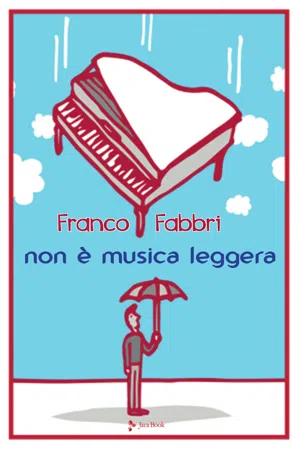
- English
- ePUB (mobile friendly)
- Available on iOS & Android
Non è musica leggera
About this book
Quella di definire una musica «al contrario» è una pratica più comune di quanto non sembri. Nell'Ottocento si dovette trovare un nome per la musica che non era d'arte né folk, e nacquero i concetti di popular music, di musica leggera, di musique de variétés. Ancora quarant'anni fa qualcuno la chiamava musica extracolta. E allora perché non definire la musica colta come quella musica «che non è leggera»? Spesso un cambiamento di prospettiva fa vedere le cose sotto un'altra luce. La prima parte di questo libro (con un'unica eccezione) contiene saggi su musiche nate fra l'inizio del Novecento e i primi anni Duemila, da Mahler a Donatoni, Sciarrino e France-sconi, passando per Ives, Bartók, Weill, Šostakovi?, Schönberg, Bernstein, Glass, Zappa (lo Zappa «colto», naturalmente) e altri. La seconda parte contiene saggi teorici su musica e musicologia, che affrontano la musica eurocolta come una delle culture musicali del pianeta, non la sola. Non è musica leggera, appunto.
Frequently asked questions
- Essential is ideal for learners and professionals who enjoy exploring a wide range of subjects. Access the Essential Library with 800,000+ trusted titles and best-sellers across business, personal growth, and the humanities. Includes unlimited reading time and Standard Read Aloud voice.
- Complete: Perfect for advanced learners and researchers needing full, unrestricted access. Unlock 1.4M+ books across hundreds of subjects, including academic and specialized titles. The Complete Plan also includes advanced features like Premium Read Aloud and Research Assistant.
Please note we cannot support devices running on iOS 13 and Android 7 or earlier. Learn more about using the app.
Information
BIBLIOGRAFIA
Table of contents
- Copertina
- Frontespizio
- Copyright
- INDICE
- Epigrafe
- Non è musica leggera
- Das Lied von der Erde: il messaggio di un addio
- Il romanzo della Nona
- Geografie della passione
- Quale opera? E quali soldi?
- Avere naso e non far finta di niente
- Richard Strauss. Metamorphosen, Studio (versione per 50 archi)
- Arnold Schönberg. Trio per violino, viola e violoncello, Op. 45
- «Atmosfere» o paesaggi sonori?
- Da un Einstein all’altro, fino a Wall Street
- L’America, la morte, il bisogno di comunicare, qualcosa da costruire. A Quiet Place and Trouble in Tahiti di Leonard Bernstein
- Il Requiem polacco: religione e spettacolarità nella musica di Krzysztof Penderecki
- «… au théâtre à faire le reste»: genesi o spiegazione dell’Orfeo
- L’esattezza, e altre ossessioni
- Witold Lutosławski: necessità del caso
- Un granello di sax
- Musiche da The Yellow Shark
- Zappa e l’elettroacustica
- C’è un’altra Grecia
- I nomi delle musiche
- La musica come forma dell’interrelazione sociale
- Sonde: la direzione del nuovo
- La linea, il corpo, la politica
- Il corpo nella mente musicale
- La musica: un falso molto autentico, veramente fasullo
- Folle in marcia: i Carmina Burana e la musica pop
- La musica di strada, il senso comune, le buone intenzioni
- L’inganno della «ricerca»: l’Art Research e la sopravvivenza delle Humanities nella crisi finanziaria e politica degli anni 2010
- Bibliografia
- Fonti
- L’Autore